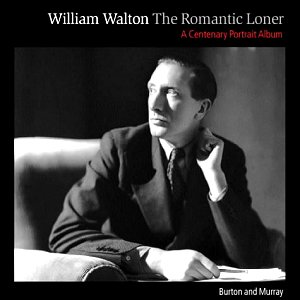Book Review
Film composer John Williams once told me that William
Walton’s film music was held in very high esteem in Hollywood. In fact
his scores for Hamlet and Henry V were nominated for Academy
Awards (both facts shamefully ignored by Halliwell’s Film and
Video Guide in their crassly brief coverage of his film career).
This new picture biography from OUP in their celebrated
‘portrait album’ series that has included Elgar and Vaughan Williams,
includes a full coverage of the composer’s achievements in film music.
In the main I shall confine my remarks to this genre because my colleague
Christopher Fifield has already contributed an excellent review of the
book and I direct admirers of Walton’s music, as a whole, to his review
via this link
Walton’s life story would have made an interesting
screenplay in itself. Born in Oldham, Lancashire, he left that mill
town to enter Christ Church Cathedral Choir, Oxford at ten, and went
on to become an Oxford undergraduate. As a young man he became something
of a ‘cuckoo in the nest’ with the bohemian Sitwells and wrote for Edith
Sitwell music for her extravagant verses (Façade). His
love life was colourful. He had an eye for the ladies. One of his first
loves was the daughter of a German prince and widow of a baron much
older than herself. At length the affair foundered and caused Walton
much pain, pain that he sublimated in his First Symphony. Later, he
fell happily in love with Alice, Viscountess Wimborne, beautiful, intelligent,
fun-loving, patroness of the arts and married to one of the richest
men in Britain. Theirs was what they used to call an ‘Edwardian marriage’.
She was twenty-two years older than William. Her love inspired his beautiful
Violin Concerto. Alas Alice died of cancer in 1948. Then, in Buenos
Aires, Walton caught the eye of the British Council’s social secretary,
a vivacious girl of 22. Immediately he proposed marriage to her and
kept on proposing when she refused him. Ultimately, he succeeded and
they married in 1949. She became Lady Susana Walton in January 1951
and they settled on the idyllic island of Ischia in the Bay of Naples
well away from the British musical establishment.
The book includes stills from many of the films that
Walton scored; plus a full list of them commencing with Escape Me
Never (there are rare stills from this 1935 film and from Stolen
Life and Dreaming Lips, scored in the late 1930s) to his
last film – Laurence Olivier’s film version of his National Theatre
production of Chekhov’s The Three Sisters (1970). Walton
had a great admiration and affection for Sir Laurence Olivier; accordingly,
the book includes many pictures of the celebrated actor. There is for
instance, a photograph from 1942 of Olivier as an officer in the Fleet
Air Arm. Another shows him with his wife Vivien Leigh together with
William and Susana. The caption reads: "…the Waltons sustained
Olivier through his wife’s bouts of mental illness." On a page
devoted to the making of the film, The Battle of Britain (1969),
there is not only a picture of Olivier in the role of Air chief Marshall
Sir Hugh Dowding but also a photograph of the film’s producers, S.Benjamin
Fisz and Harry Saltman who rejected Walton’s score. (Reportedly, Walton
had not composed enough music to fill a soundtrack LP and they favoured
the more commercial music of Ron Goodwin.). Olivier threatened to remove
his name from the film credits unless some of Walton’s music was restored.
Sir William Walton died on 5 March 1983, just three
weeks before his 81st birthday.
For film music fans and lovers of Walton’s music in
general, this is highly recommended – a coffee table format book to
be treasured.
Ian Lace
see also review by Chris
Fifield


